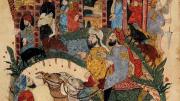Much of the late Harold Bloom’s literary criticism is bewildering, but one of his coinages—“the anxiety of influence”—has the ring of truth. It certainly applies to al-Hariri, who is possibly the most celebrated author ever to write in Arabic. He was born in Mashan, a southern Iraqi town whose abundant palm groves were the source of his family fortune. Besides tending to his estate, he worked as an informant on behalf of the government in Baghdad, reporting on local events and keeping an eye out for trouble. These occupations seem to have afforded him the free time to indulge his compulsive interest in a form of writing called the maqamah.
Maqamah means “time or place of standing”; originally it meant a speech delivered while standing in a public place, as opposed to one made while sitting comfortably with friends. Around the year 1000, a precocious young author named al-Hamadhani applied the term to several short stories of his own invention. His hero, a con man called “the Alexandrine,” claims to be able to do everything from improvising verse to bringing corpses back to life. The stories themselves—which might be called “impostures” in English, to honor their trickster hero—are written entirely in rhyme, and feature clever references to the Qur’an, ancient Arabic poetry, and other well-known texts. Al-Hamadhani’s impostures earned him the nickname “Wonder of the Age,” a title implying that it would be a good long time before anyone managed to produce anything half as entertaining.
Why al-Hariri decided to tackle this seemingly impossible task remains a matter of dispute. One report has it that a stranger one day appeared in nearby Basra, preaching in the city’s mosques and collecting alms from bystanders amazed by his eloquence. This figure supposedly inspired al-Hariri to write a story about a similar character in the maqamah style. Another report has it that “the Wonder of the Age” was mentioned at a literary gathering al-Hariri happened to attend. The unnamed host, apparently a powerful official, then challenged al-Hariri to write impostures of his own. Whatever the inspiration, al-Hariri ended up writing 50, 10 more than the number traditionally credited to his predecessor.
There was only one problem. Unlike al-Hamadhani, who could compose on the spot, al-Hariri was a plodding, nitpicking fellow who had to “blacken page after page” before he had a text he was happy with. His biographers do not say that he wrote but rather that he “strained to write,” adding that he would pull at his beard as he scribbled, to the point that he yanked all the hairs out. When on one occasion he was asked to improvise a story, he made several attempts and finally fled the room in embarrassment. In all likelihood, then, he was terrified when, in 1111, he took his carefully copied manuscript of all 50 impostures to Baghdad to have it read aloud to a gathering of the capital’s arbiters of taste. In his introductory remarks, he modestly calls his work “a faint and feeble copy” of the original impostures. But in the forty-seventh episode, his hero, a con man called Abu Zayd, proclaims:
Now the chap from Alexandria,
I admit, came first;
But the dew that falls before the rain
Ain’t never quenched a thirst.
How exactly were al-Hariri’s stories better? His own answer would probably be that he upped the stakes when it came to intricate wordplay. One of his hero’s speeches can be read forward or backward, giving a coherent meaning each time. Two of his fire-and-brimstone sermons (a much-practiced genre) contain only words without diacritical dots—meaning they use only half the letters of the Arabic alphabet. And several stories are composed using words of double meaning, such that the text can be read twice and mean something entirely different each time. Accompanying all these flourishes are rhymes, riddles, and palindromes, some of which extend to seemingly impossible lengths. No wonder, then, that al-Hariri literally tore his hair out to produce his Impostures.
In the event, his high opinion of his own work proved well founded. His stories became a byword for brilliant composition, and generations of students from Africa to Central Asia—“from Ghana to Fergana,” as al-Hariri put it—spent countless hours scribbling their teachers’ explanations of difficult words on the margins of their copies. What is arguably the most impenetrable book ever written in Arabic thus became its most popular teaching text: as if English were to be taught using, say, Finnegans Wake. Perhaps, though, those generations of learners were onto something. Whatever else it may be, al-Hariri’s work is rule-governed, which makes it possible to produce imitations, good or bad, with relative ease. Knowing that one’s second sentence has to rhyme with one’s first limits the number of words an essayist can use, and for some learners this constraint can be enormously helpful.
By the time he died, al-Hariri had learned to relax at least a little. On one occasion a student who was reading from the Impostures misread a word. “I like your word better,” said the author indulgently, “but I’ve already signed 700 copies with my word in them, and it’s too late to take them back now.” Like Chaucer, he appended to his masterwork a pious retraction, saying that he would have done better to spend his time praying for salvation. His many readers around the world are thankful he did not.









